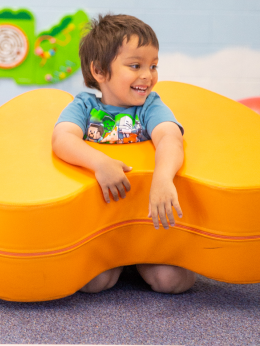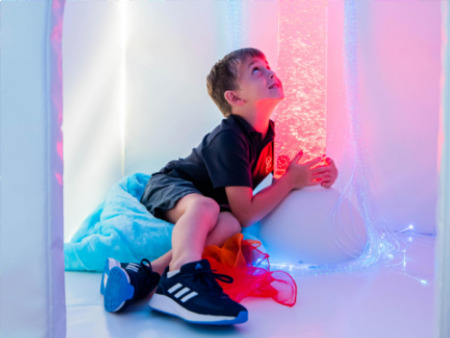When your child is forgetful, aggressive or easily stressed, is it a behavior problem or a sensory issue? That's the six million dollar question that led my friend to call me, hoping for a clear answer.
At school, her child is being placed in "time out" on a regular basis because she is hitting. She is not a violent child and for the most part well behaved, but it seems that when she's tired or over-stimulated, she acts out.
If you have a child who is a sensory seeker, you will understand this child. Yet, if your child is the recipient of the blow to the face, you may be thinking that this child has a behavioral problem. More often than not, it's a combination of both.
As humans, we are physically oriented and driven. The amygdala, which is situated deep inside our brains, provides us with an immediate response to physical and emotional stimuli. Fear will send us running in the opposite direction and a hot room will make us fidget and sweat. Children don't usually have the means to modulate their responses. And, honestly, many adults don't either.
But that is how we differ from animals. We have a frontal lobe that can be taught to override our automatic responses -- with some training. And that is the key point.
We have to be taught.
Yet, it is crucial for parents, teachers and children to notice and understand the type of sensory responder a child might be and provide a sensory diet before implementing a behavior plan. And that plan needs to take into consideration the sensory type. Let's look at the types first and then we can determine how to help our kids regulate their responses.
- Overly sensitive (Over Responder): If your child is overly sensitive, then things like bright lights, loud noises or strong odors can send him reeling across the room and hiding under a blanket. These children usually respond very well to soothing sounds, weighted blankets, lavender or sage aromatherapy, a chewy or swinging on a hammock. They need calm and organization to function. They can get easily stressed and anxiety may come along with their hypersensitivity. A weighted vest, pressure clothing or a nice hug can be beneficial to help normalize their sensory needs.
- Under sensitive (Under Responder): These children sometimes don't respond at all. They tend to be disorganized, and may not hear their name called. They may forget their lunch, drop their shoes in different spots in the house and not wake up on time. They respond very well to visual charts, schedules, reminders and movement that help them stay alert such as using a ball chair. Hand-eye coordination, sports, and exercise are important to their development as well.
- Sensory Seeking: Got a monkey on your hands? Sensory seekers love to move, touch, jump and shout. The only problem is that not every one around then appreciates their energy. They need heavy work to keep their muscles organized yet stimulated. They respond well to active swings, trampolines, deep pressure, coordination, obstacle courses and activities like karate that keep their bodies moving but also implement concentration and respect.
Now back to our behavior question. Is it a sensory issue or a behavior problem? It's both. Your child is more than likely responding to sensory stimuli, in the most comfortable way for their body. If the behavior is bothersome or damaging physically, emotionally or socially in the long run, it needs to be curbed and redirected. A child needs to understand that hitting is not tolerated, and humming in class is not appropriate either.
I love the 21-day behavior plan. Choose the behavior that you are trying to curb and set up a 21-day plan. For each day that the behavior is minimal or controlled, the child earns a star. After 21 days, the child gets a prize or reward. If the child slips up, and here is the most important part, he starts over. There are no consequences for minor mistakes, just rewards for succeeding. And, in the meanwhile, you are providing a sensory diet to meet the child's needs.


















Comments